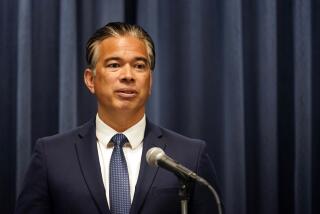Regulators Flexing Muscles in Hon Deal : Thrifts: Their objections to terms of the developer’s agreement to buy major properties from Landmark leaves S&L; industry puzzled.
- Share via
Federal savings and loan regulators demonstrated their growing clout on Monday with their objection to Orange County developer Barry G. Hon’s $967-million purchase of Landmark Land Co.’s major resort properties.
The muscle-flexing has left thrift operators and real estate developers guessing how to cope with strict new industry regulations enacted last August to rescue the S&L; deposit insurance system.
While Hon thought he had met the federal thrift rules in the deal for land owned by Landmark’s main subsidiary, Oak Tree Savings Bank in New Orleans, regulators decided the thrift was loaning him too much.
“It shows again that even though a deal (appears to) meet all the requirements of the new law, the regulators could still force you to restructure it,” said Lawrence Grill, chairman and president of Universal Savings Bank in Orange. “It’s the price of being in a regulated industry.”
Now Hon and Carmel-based Landmark said they will try to find another way to arrange the financing and complete the deal, which involves such well-known properties as the Mission Hills Country Club, PGA West and La Quinta Golf & Tennis Club.
The regulators’ questioning of the transaction does not surprise other thrift executives who also are finding it tough to operate under the thrift bailout law. The myriad of mandates imposed by the law and enforced through tough regulations has reshaped thrifts more in the image of banks and has greatly restricted their operations.
Institutions such as Columbia Savings & Loan in Beverly Hills and FarWest Savings in Newport Beach, for instance, have lost millions of dollars mainly because of the law’s requirement to sell high-risk, high-yield junk bonds within five years. The requirement has helped fuel a drop in the value of their securities holdings.
And thrifts such as Oak Tree and Downey Savings & Loan in Newport Beach have been ordered to get out of the real estate development business within five years. Downey Savings is dismantling a highly profitable real estate operation that had made it the premier developer and operator of neighborhood shopping centers in California and Arizona.
Oak Tree thought it had taken a giant step out of the real estate business by selling properties in three states to Hon. The thrift believed that the deal would not be held up by a restrictive new rule that limited the amount of money a thrift could loan to one borrower to 15% of the institution’s capital. Previously, thrifts were able to lend amounts equal to 100% of capital.
Regulators appeared to give a boost to the Hon deal and similar deals a month ago when they decided that the single-borrower restrictions would not be invoked when thrifts sell property they already own and “take back paper,” or essentially finance it themselves.
Still, regulators decided that the credit Oak Tree would be extending to Hon was simply too high. At more than $750 million, the loan would represent more than 25% of the institution’s assets.
Regulators suggested that Oak Tree take more time to sell its properties and that it find more borrowers, Barton said. “But they had no objections to Barry Hon or to the values of the properties,” he said.
More to Read
Inside the business of entertainment
The Wide Shot brings you news, analysis and insights on everything from streaming wars to production — and what it all means for the future.
You may occasionally receive promotional content from the Los Angeles Times.










